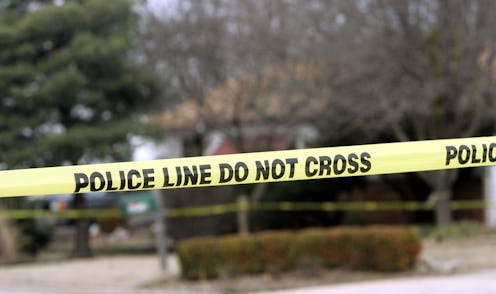News
What Are The Legal Penalties Of Hate Crimes?
Thus far, authorities believe that Wednesday night's Emanuel AME Church shooting in Charleston, South Carolina qualifies legally as a hate crime, and therefore, it's very likely that the case will be prosecuted as one if suspect Dylann Storm Roof goes to trial. So what are the exact legal penalties of a hate crime? Though they vary from state to state, many hate crimes are felonies and can be punished by life in prison or even the death penalty — but South Carolina is an unfortunate exception when it comes to hate crime legislation.
Hate crimes are bias-motivated crimes that involve a perpetrator targeting an individual or group of individuals because of their perceived membership of a certain race, nationality, religion, sexual orientation, gender, disability, or other group. While not all states even have specific hate crime laws, proponents of separate legislation argue that crimes fueled by bias are not only a threat to certain individuals but to whole communities and portions of the general population. And because of the bias at the basis of hate crimes, racial, ethnic, and religious minorities, as well gay people and transgender people, are more likely to be targeted in a violent crime and therefore need more protection.
According to the United States Department of Justice, hate crimes can be much more serious than other crimes because they're "likely to create or exacerbate tensions, which can trigger larger community-wide racial conflict, civil disturbances, and even riots."
As for specific punishments, they vary from state to state, but the Civil Rights Act of 1964 also permitted hate crimes to be federally prosecuted. According to the FBI's site, under the various sections of federal criminal and penal code Title 18, hate crimes can be punishable as follows:
- If the perpetrator willfully causes or attempts to cause bodily injury to a target or targets because of their actual or perceived race, color, religion, national origin, the crime is punishable by a maximum 10–year prison term, unless death (or attempts to kill) results from the offense.
- If any person acting under color of law, statute, ordinance, regulation, or custom willfully deprives or causes to be deprived from any person those rights, privileges, or immunities secured or protected by the Constitution and laws of the U.S., punishment for that crime varies from one year in prison and/or a fine to life in prison and even the death penalty, depending on whether bodily harm, death, attempts to kill, aggravated sexual abuse, and other factors are involved.
- If two or more persons conspire to injure, oppress, threaten, or intimidate any person of any state, territory, or district in the free exercise of their rights secured by the Constitution or the laws of the United States, that crime is punishable by a maximum 10-year sentence, but if death results, or if the crime involves kidnapping or an attempt to kidnap, aggravated sexual abuse or an attempt to commit aggravated sexual abuse, or an attempt to kill, then it can be punished by life in prison or even the death penalty.
- If a perpetrator intentionally defaces, damages, or destroys any religious real property, because of the religious, racial, or ethnic characteristics of that property, or intentionally obstructs by force or threat of force, or attempts to obstruct any person in the enjoyment of that person's free exercise of religious beliefs, the penalties vary from one year in prison and/or a fine to life in prison and even the death penalty, depending on whether bodily harm, death, attempts to kill, aggravated sexual abuse, and other factors are involved.
Currently, 45 states and the District of Columbia have statutes that legally penalize hate crimes — the five states that don't are Georgia, Arkansas, Indiana, Wyoming, and — unfortunately — South Carolina. All of the states with existing statutes cover crimes based on bias against race, religion, and ethnicity, 32 cover disability, 31 cover sexual orientation, 28 cover gender, 16 cover gender identity, 13 cover age, five cover political affiliation, and three, plus D.C., cover homelessness.Because South Carolina does not have hate crime laws in place, the Emanuel AME Church shooting will be federally prosecuted. However, additional state laws would have certainly helped to further protect the victims as well as potential future victims.
